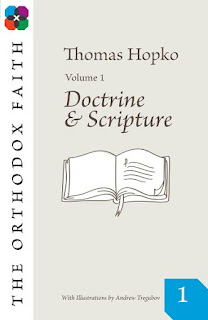 |
| Fr. Thomas Hopko at Christ the Savior-Holy Spirit, Lenten Retreat 2010. |
Dear Parish Faithful,
I wrote last week reminding the parish that the one-year anniversary of the repose of Protopresbyter Thomas Hopko was commemorated on March 18. In fact, at yesterday's memorial service following the Liturgy we remembered Fr. Tom together with Archimandrites Roman (Braga) and Afanasy. Fr. Hopko spent his retirement years in a home right by the Monastery of the Transfiguration in Ellwood City, PA, and became an integral part of the community for many years through serving and teaching. Whenever visiting the monastery through the years, it was always great to see Fr. Tom and sometimes serve with him in the monastery's chapel.
 |
| Mother Alexandra |
The monastery publishes a fine journal on a quarterly basis, entitled Life Transfigured. The latest issue was dedicated to the foundress of the monastery, Mother Alexandra, the former Princess Ileana of Romania. This dedication is in recognition that the twenty-fifth anniversary of her repose in the Lord occurred this last January. The entire issue is made up of short essays or articles that she had written over the years in both Europe and the United States.
As Mother Alexandra established the monastery in 1962 (I believe) she becomes one of the great pioneers of Orthodox monasticism in North America, certainly of women's monasticism. A very fond memory for both Presbyter and myself was that of hosting Mother Alexandra in our home when she came to lead a retreat in the small mission I was serving in London, Ontario, Canada, before coming to Cincinnati. She left having made a great impact on our community there. Born into royalty, Mother Alexandra was a woman of great cultural and spiritual refinement. Yet, through her profound Christian faith, she was also deeply humble and aware of the equality of all human beings before God and our need to repent of our sins.
Yesterday, we read aloud in the church her short but moving meditation on the First Commandment. Based on the words of Christ as recording in the Gospel according to St. Mark: "Thou shalt love the Lord thy God with all thy heart, and with all thy soul, and with all thy mind and with all they strength. This is the first commandment;" she began her meditation with the following memorable words:
"How many Christians really fulfill this commandment? How many other persons or things come first? How many people realize, O Lord, that You do not come between them and other loves, but quite the contrary, other loves and cares come between them and You! The greater our love for God the more our love for home, parents, children and friends grows. How many even of those that have embraced some form of religious life are conscious of this factor in their spiritual thoughts?"
She closed this meditation with the following prayer that must have been of her own composition:
O! my Lord God, fill my empty heart with Thy love,
revive my flagging spirits. Make me strong through
Thy strength, making me compassionate by Thy
compassion; now that at last I am an empty shell
I pray Thee fill me utterly with Thy love so that my
love may faithful reflect Thy for me and all mankind.
Amen.
A further meditation in this issue is entitled "Regret and Repentance." I would like to share this short meditation with everyone, noting its deep lenten significance, perhaps as we prepare for the Sacrament of Confession:
There is a great deal of difference between regretting sins we have committed and feeling true contrition about them, repenting of them.
To regret, actually means to be sorry for a loss, or distressed about an event. This, of course, is no bad start in relation to sin, because in sinning we have indeed lost a great deal more than we realize. With each sin, big or small, we fall away from grace. Also, sins have an uncomfortable way of having visibly uncomfortable consequences, events for which we most certainly are sorry.
But this is a long way from real contrition that brings repentance. True repentance is not only grief in the unfortunate consequences of our thoughts or actions, a hatred for what we have done, but also deep sorrow for the impulse that gave birth to sin. It awakes the desire to do penance, to make good, to purge ourselves. We become conscious of the stain upon the soul. That is why the 50th (51st) Psalm is given such predominance in all our services, for it is the real prayer of repentance: "cleanse me from my sin, for I acknowledge my transgression: and my sin is ever before me." Repentance also includes the hope of forgiveness, the knowledge that God can wipe out the stain: "Purge me with hyssop, and I shall be clean; wash me and I shall be whiter than snow."
Yet David, when he wrote this, had not the assurance that we have, that if we repent, we are forgiven. "This is My blood of the New Testament which is shed for you for the remission of sins."
Christ instituted the Sacrament of Confession to give you an opportunity, even many opportunities, to heal the diseases that afflict the soul. When did you last repent and go to confession instead of just being sorry?
Going back twenty five years to the repose of Mother Alexandra, we realize that we have lost many great figures of Orthodoxy in that time span. Yet, they are still with us "in spirit" as we trust by the mercy of God they now reside in the Kingdom of heaven and pray for us. And we have their written legacy in the form of their writings to nourish us as we are hopefully on that same path.













